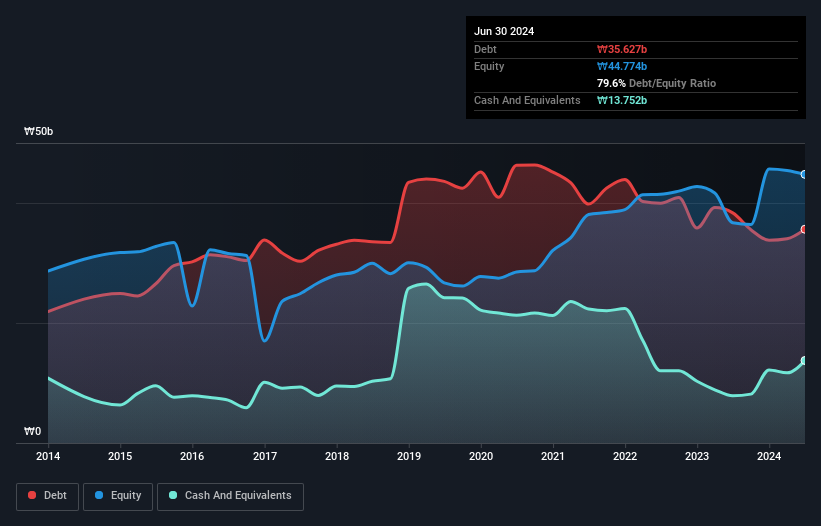The external fund manager backed by Berkshire Hathaway's Charlie Munger, Li Lu, makes no bones about it when he says 'The biggest investment risk is not the volatility of prices, but whether you will suffer a permanent loss of capital.' So it might be obvious that you need to consider debt, when you think about how risky any given stock is, because too much debt can sink a company. We can see that TPC Mechatronics Corporation (KOSDAQ:048770) does use debt in its business. But is this debt a concern to shareholders?
What Risk Does Debt Bring?
Debt and other liabilities become risky for a business when it cannot easily fulfill those obligations, either with free cash flow or by raising capital at an attractive price. Ultimately, if the company can't fulfill its legal obligations to repay debt, shareholders could walk away with nothing. However, a more common (but still painful) scenario is that it has to raise new equity capital at a low price, thus permanently diluting shareholders. Having said that, the most common situation is where a company manages its debt reasonably well - and to its own advantage. The first thing to do when considering how much debt a business uses is to look at its cash and debt together.
View our latest analysis for TPC Mechatronics
How Much Debt Does TPC Mechatronics Carry?
As you can see below, TPC Mechatronics had ₩35.6b of debt at June 2024, down from ₩38.3b a year prior. However, it also had ₩13.8b in cash, and so its net debt is ₩21.9b.

How Healthy Is TPC Mechatronics' Balance Sheet?
We can see from the most recent balance sheet that TPC Mechatronics had liabilities of ₩57.5b falling due within a year, and liabilities of ₩12.5b due beyond that. On the other hand, it had cash of ₩13.8b and ₩21.5b worth of receivables due within a year. So its liabilities total ₩34.8b more than the combination of its cash and short-term receivables.
This is a mountain of leverage relative to its market capitalization of ₩37.5b. Should its lenders demand that it shore up the balance sheet, shareholders would likely face severe dilution. The balance sheet is clearly the area to focus on when you are analysing debt. But it is TPC Mechatronics's earnings that will influence how the balance sheet holds up in the future. So if you're keen to discover more about its earnings, it might be worth checking out this graph of its long term earnings trend.
Over 12 months, TPC Mechatronics saw its revenue hold pretty steady, and it did not report positive earnings before interest and tax. While that's not too bad, we'd prefer see growth.
Caveat Emptor
Importantly, TPC Mechatronics had an earnings before interest and tax (EBIT) loss over the last year. Indeed, it lost ₩909m at the EBIT level. Considering that alongside the liabilities mentioned above does not give us much confidence that company should be using so much debt. So we think its balance sheet is a little strained, though not beyond repair. We would feel better if it turned its trailing twelve month loss of ₩2.4b into a profit. So in short it's a really risky stock. There's no doubt that we learn most about debt from the balance sheet. But ultimately, every company can contain risks that exist outside of the balance sheet. Be aware that TPC Mechatronics is showing 2 warning signs in our investment analysis , and 1 of those is potentially serious...
When all is said and done, sometimes its easier to focus on companies that don't even need debt. Readers can access a list of growth stocks with zero net debt 100% free, right now.
Valuation is complex, but we're here to simplify it.
Discover if TPC Mechatronics might be undervalued or overvalued with our detailed analysis, featuring fair value estimates, potential risks, dividends, insider trades, and its financial condition.
Access Free AnalysisHave feedback on this article? Concerned about the content? Get in touch with us directly. Alternatively, email editorial-team (at) simplywallst.com.
This article by Simply Wall St is general in nature. We provide commentary based on historical data and analyst forecasts only using an unbiased methodology and our articles are not intended to be financial advice. It does not constitute a recommendation to buy or sell any stock, and does not take account of your objectives, or your financial situation. We aim to bring you long-term focused analysis driven by fundamental data. Note that our analysis may not factor in the latest price-sensitive company announcements or qualitative material. Simply Wall St has no position in any stocks mentioned.
About KOSDAQ:A048770
TPC Mechatronics
Primarily manufactures and sells pneumatic equipment in South Korea and internationally.
Slight risk with mediocre balance sheet.
Market Insights
Community Narratives



